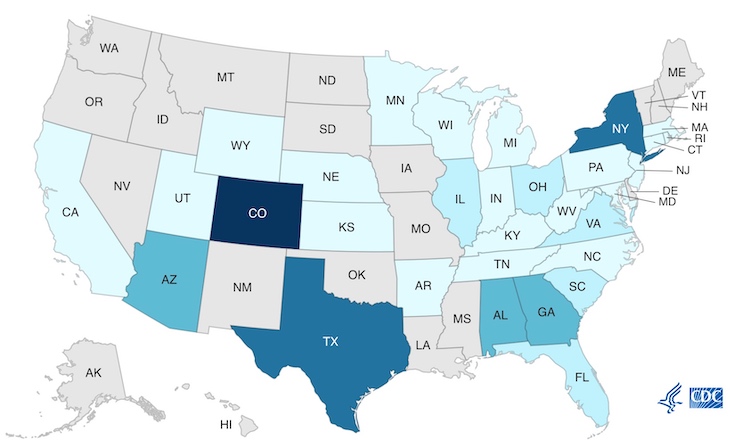The nationwide cyclospora outbreak of domestically acquired cases has sickened at least 581 people, according to the Centers for Disease Control and Prevention (CDC). Fifty-five people have been hospitalized because they are so sick. That is a huge increase of 371 more patients since the last update on June 23, 2023.

The case count range by state is: Arkansas (1-10), California (1-10), Connecticut (1-10), Indiana (1-10), Kansas (1-10), Kentucky (1-10), Massachusetts (1-10), Maryland (1-10), Michigan (1-10), Minnesota (1-10), North Carolina (1-10), Nebraska (1-10), New Jersey (1-10), Pennsylvania (1-10), Rhode Island (1-10), Tennessee (1-10), Utah (1-10), Wisconsin (1-10), West Virginia (1-10), Wyoming (1-10), Florida (11-30), Illinois (11-30), Ohio (11-30), South Carolina (11-30), Virginia (11-30), Alabama (11-30), Arizona (11-30), Georgia (11-30), New York (61-90), Texas (61-90), and Colorado (91-120).
Illness onset dates began on April 1, 2023. This is unusual because the cyclospora season in the United States usually begins in May, although cases occur year round. The patient age range is from 3 to 96. Illness onset dates range from April 1 to July 2, 2023.
These cases include the outbreak in Georgia and Alabama, where 20 people were sickened. That outbreak cluster was associated with raw imported broccoli. The FDA could not identify a single type of producer of that broccoli. At this time, there is no indication that broccoli is still a source of illness for the other cyclosporiasis cases reported.
In the past, cyclospora outbreaks have been linked to raspberries, mesclun lettuce, vegetable trays, bagged salad, basil, and cilantro. But any fruit or vegetable can be contaminated.
Symptoms of cyclosporiasis include explosive and profuse diarrhea that can last for months, abdominal cramps, gas, bloating, nausea, loss of appetite, weight loss, fatigue, body aches, fever, and vomiting. The symptoms can disappear and recur for months. Treatment is a sulfa based drug.
No specific foods have been identified in this large number of illnesses. To protect yourself, always rinse off fruits and vegetables before you prepare or eat them. It is impossible to rinse off every single oocyst, but cooking does kill this parasite. This infection does not pass person-to-person, since the oocyst must mature in the environment to become infective after it is passed in feces.

If you have been sickened with a food poisoning infection, please contact our experienced attorneys for help with a possible lawsuit at 1-888-377-8900 or text us at 612-261-0856. Our firm represents clients in lawsuits against grocery stores, restaurants, and food processors.




